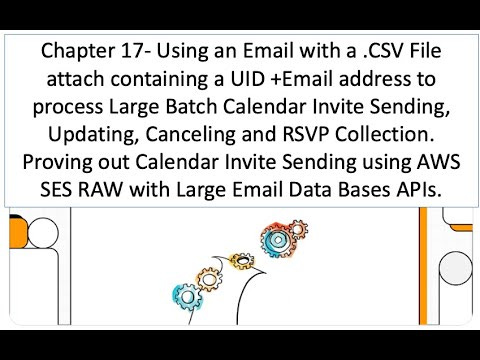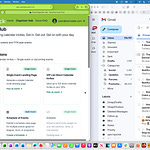Briefing Document: Calendar Invite Server - Get New Bulk Event Invites from Email attachment
Date: February 24, 2025 (Last Revision) Source: "Chapter ‐ 17 Get New Bulk Event Invites from Email ‐ Technical Overview · calendarinvite/calendarinviteserver Wiki · GitHub"
1. Overview and Purpose
The "Get New Bulk Event Invites from Email" function within the Calendar Invite Server (CIS) is designed to automate and streamline the process of sending event invitations to a large number of attendees via email. It achieves this by allowing organizers to submit event invite requests through email, with attendee details provided in an attached CSV file. The system then validates these requests and queues valid invites for processing, while also giving feedback to the sender regarding the status of their request.
The primary goal is to provide "efficient and scalable event invite management" by leveraging various AWS services to handle the entire lifecycle from email submission to notification.
2. Key Themes and Functionality
This function revolves around several core themes:
Automation of Bulk Calendar Invite Event Invitations: The system automates the traditionally manual process of sending invites to many people.
Email-Driven Workflow: The entry point for bulk invitation requests is an email with an attached CSV file.
Robust Validation: The system incorporates multiple layers of validation, including sender authorization and individual attendee email validation.
Scalability and Reliability (AWS Services): The architecture relies heavily on AWS services to ensure the process is scalable, resilient, and efficient.
Transparency and Feedback: Senders are kept informed about the success or failure of their bulk invite requests through status reports.
2.1. Event Processing Flow
The process for handling bulk event invites can be broken down into six main steps:
Trigger: "The function is triggered by an SQS event linked to an S3 upload notification." This implies that the email, likely with the CSV, is first uploaded to S3, which then triggers a notification to an SQS queue, which in turn triggers the AWS Lambda function.
Extract Email Data: The system retrieves the CSV file and the sender's email address from S3.
Validate Sender: Crucially, the system "Checks if the sender is an authorized bulk sender" and "Verifies that the sender is the organizer of the specified event." This ensures security and proper authorization.
Process Attendees: Each invitee's email address within the CSV is validated, and attendees are categorized into "valid and invalid invites."
Queue Valid Invites: Valid invitations are sent "to an SNS topic for processing," suggesting further downstream services will handle the actual sending of individual invites.
Notify Sender: "Sends an SES email to the sender with a summary of accepted and rejected invites." This provides crucial feedback.
2.2. Key Functions (Code Components)
The document outlines several key functions that perform specific tasks within the overall process:
lambda_handler(event, *): The entry point for the AWS Lambda function, extracting the S3 file location and calling process_bulk_event_invites.
process_bulk_event_invites(event): The orchestrator function that retrieves data, validates, queues, and sends status reports.
get_s3_file_location_from_sns_notification(sns_notification): Extracts S3 details from the notification.
get_s3_file_content(bucket, key): Retrieves and decodes the CSV file from S3.
get_email_request(s3_file): Parses email headers for sender information.
sender_authorized_to_send_bulk_invites(sender): Queries DynamoDB for sender authorization.
get_event_invites(sender, email_request): Parses and validates attendee data from the CSV.
queue_event_invites_for_send(event, event_invites): Publishes valid invites to an SNS topic.
send_sender_status_of_bulk_request(sender, event_invites, invalid_invites): Sends the summary email via SES.
3. Most Important Ideas and Facts
Core Function: Processes event invite requests sent via email with attendee details in an attached CSV.
AWS Service Stack: This function heavily relies on the following AWS services:
Lambda: For serverless compute and processing email requests.
S3: For storing and retrieving CSV files.
DynamoDB: For managing organizer authorization and event records.
SNS: For queuing valid invites for subsequent processing.
SES: For sending status reports back to the sender.
Authorization is Critical: The system explicitly checks if the "sender is an authorized bulk sender" and "Verifies that the sender is the organizer of the specified event," indicating a strong focus on security and access control.
CSV File Format: The required CSV format is simple, containing uid (Unique identifier for the event), email (Attendee’s email address), and name (Attendee’s name).
Data Storage (DynamoDB): DynamoDB records are used for:
Organizer Authorization (pk: organizer#, sk: bulk#)
Event Record Lookup (pk: event#, sk: event#)
Error Handling: The system includes mechanisms for handling:
Invalid Invites: Grouped and reported back to the sender.
Unauthorized Senders: Logged but not processed.
Exception Logging: For traceability.
Environmental Variables: Critical configuration is managed via environmental variables, including REGION, THIRTYONE_TABLE (DynamoDB table), NEW_EVENT_INVITE (SNS topic ARN), and SYSTEM_EMAIL.
4. Conclusion
The "Get New Bulk Event Invites from Email" function is a robust and automated solution for managing bulk event invitations. By integrating several AWS services, it provides a scalable, secure, and efficient mechanism for processing email-based invite requests, validating senders and attendees, and delivering comprehensive feedback to organizers. Its design emphasizes automation, validation, and clear communication, making it a key component of the Calendar Invite Server's overall event management capabilities.












